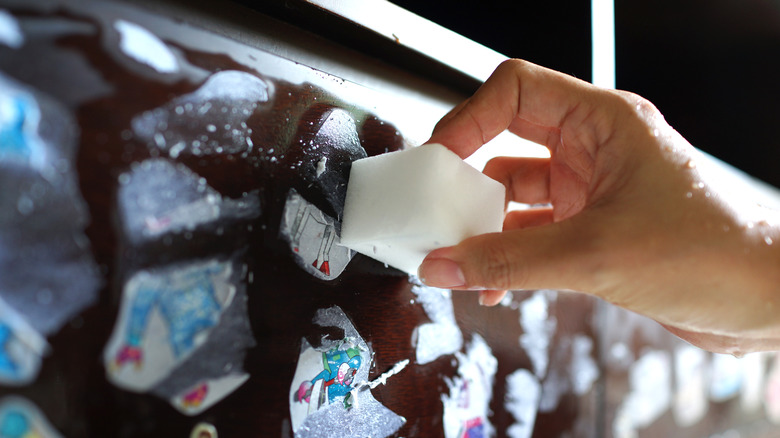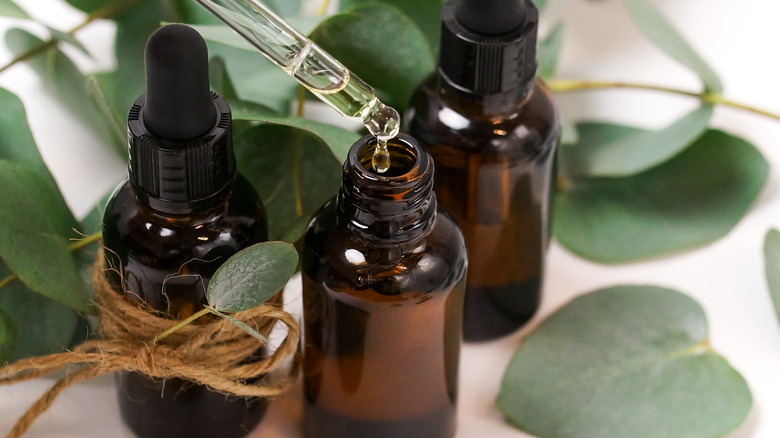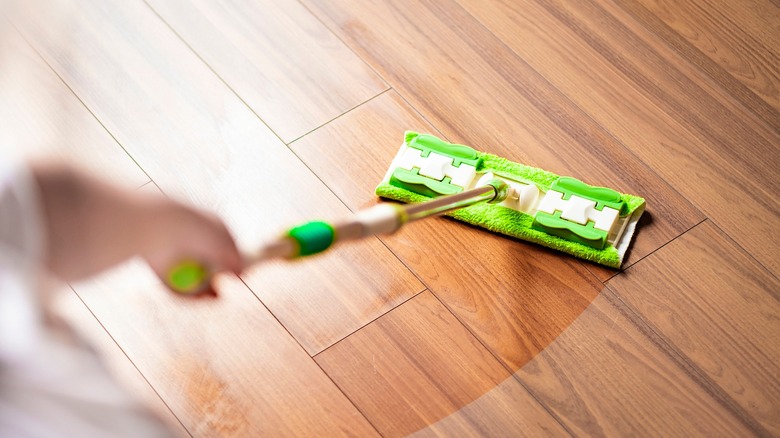This Essential Oil Is A Lifesaver When Dealing With Sticky Residue
Have you ever tried to peel off a price sticker from a new item you purchased from the store, only for remnants of the sticky adhesive to be left behind in its place? There's almost nothing more satisfying than peeling the sticker off with one attempt, but after a less-than-perfect try, you may have to break out the household cleaners to get rid of the sticky mess once and for all. But if you're fresh out of Goo Gone or other similar adhesive removers, you can remove sticky residue from your home's floors and surfaces all the same with just a few drops of undiluted eucalyptus oil.
Unlike your diverse selection of chemical glue solvents, eucalyptus oil serves as a natural solution to an all-too-familiar problem. A 2010 study published in Alternative Medicine Review found that the oil also features antimicrobial and disinfectant properties that can make your home's surfaces germ-free while leaving behind a woodsy, earthy scent that many recognize and love. Note that ingesting the oil can lead to the life-threatening condition known as eucalyptus poisoning, and direct skin contact may cause irritation, so you'll want to make sure you don't leave children unattended with the substance. But as long as you're being safe, there are ways to use eucalyptus oil in your home to clean up sticky residue.
The pros and cons of using eucalyptus oil
Eucalyptus oil is generally successful when used on sticky surfaces because it features special dissolving properties that break down dirt and grease, and makes it easier to wipe up using a rag or paper towel. Such properties wreak havoc on gooey messes like chewing gum, school glue, and even tar stains that may wind up on the paintwork of your car after driving it. Another common obstacle for homeowners, residue left over from duct tape and masking tape also stands little chance against the disintegrating power of eucalyptus oil, whether found on your floors, furniture, or household appliances.
However, the essential oil also has its pitfalls. A 2015 digital journal article published in the AICCM Bulletin, originally published in 1992, states that eucalyptus oil isn't as effective as acetone at dissolving sticky residue, a popular household chemical used to remove nail polish and various types of paint. The study also asserts that eucalyptus oil is capable of staining household surfaces after being used as a solvent for adhesives. While eucalyptus oil can leave your stainless steel appliances sparkling, damage is especially likely to occur when eucalyptus oil is applied to softer surfaces like natural wood.
How to remove sticky residue with eucalyptus oil
The steps involved in using eucalyptus oil to clean adhesive residue around the house don't differ much from the procedures you would follow while working with traditional chemical removers. To wipe up sticky residues on a hard surface, like your floor or a kitchen cabinet, simply place a few drops of the oil on a cloth and go over the mess until it comes off, taking care not to get any oil on your skin. For assistance in lifting a half-removed adhesive label or sticker from glass or plastic, dab a cotton ball or circular pad in the essential oil and press the saturated cotton against the glue for a few minutes. After giving the adhesive time to dissolve, gently wipe away the remaining residue, being careful not to damage the object underneath by being too abrasive.
And although eucalyptus oil is considered a safer alternative to toxic chemical solvents, there's still a chance that the substance can harm the external finish of the surface lying underneath the residue, even while applying it gently. Test the safety of the solution by applying it to a small section of your stained surface first before using it to remove the entire blemish at once. Preferably, test the oil's efficiency on a part of the surface that's concealed from public viewing if possible, to protect your belongings in case the cleaning attempt goes awry.


